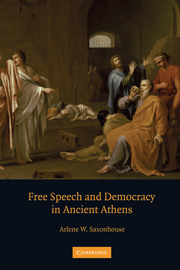Book contents
- Frontmatter
- Contents
- Acknowledgments
- Prologue: Four Stories
- PART I INTRODUCTION
- PART II AIDÔS
- PART III PARRHÊSIA: THE PRACTICE OF FREE SPEECH IN ANCIENT ATHENS
- PART IV THE LIMITS OF FREE SPEECH
- 6 Truth and Tragedy
- 7 Thucydides' Assemblies and the Challenge of Free Speech
- 8 Protagoras' Shame and Socrates' Speech
- Conclusion: Four Paradoxes
- References
- Index
8 - Protagoras' Shame and Socrates' Speech
Published online by Cambridge University Press: 06 January 2010
- Frontmatter
- Contents
- Acknowledgments
- Prologue: Four Stories
- PART I INTRODUCTION
- PART II AIDÔS
- PART III PARRHÊSIA: THE PRACTICE OF FREE SPEECH IN ANCIENT ATHENS
- PART IV THE LIMITS OF FREE SPEECH
- 6 Truth and Tragedy
- 7 Thucydides' Assemblies and the Challenge of Free Speech
- 8 Protagoras' Shame and Socrates' Speech
- Conclusion: Four Paradoxes
- References
- Index
Summary
It is time now to turn to the Platonic dialogue that gave us the aidôs of Protagoras' myth, the dialogue that takes Protagoras' name for its title and presents a Socrates skillfully and engagingly sparring with his sophistic interlocutors. Other dialogues such as the Gorgias and the Laches address more directly the practice of parrhêsia. In the Gorgias, Socrates appeals to Callicles to carry on a dialogue with him since Callicles as an Athenian enjoys parrhêsia in a way that Socrates' foreign interlocutors do not; with this freedom, Socrates claims, Callicles can be a true touchstone to Socrates' arguments (486d–8b). In the Laches, as Foucault (2001: 91–101) points out, Socrates becomes the practitioner of parrhêsia and in turn serves as a touchstone to those who come to discuss the education of their sons with him. Nevertheless, while the explicit language of parrhêsia is not present in the Protagoras as it is in the Gorgias and the Laches, quite early in the discussion Protagoras introduces aidôs. This emotion that curiously melds reverence and shame, deference to the old as well as an awareness of and concern with the gaze of others, shapes political communities into coherent bodies and transforms them into peaceful wholes rather than sites of constant warfare – at least according to Protagoras. The irreverence of speech spoken freely without deference for the old, without any concern with the judgment of others, however, marks the Socratic style of discourse as we saw in the Apology.
- Type
- Chapter
- Information
- Free Speech and Democracy in Ancient Athens , pp. 179 - 206Publisher: Cambridge University PressPrint publication year: 2005



